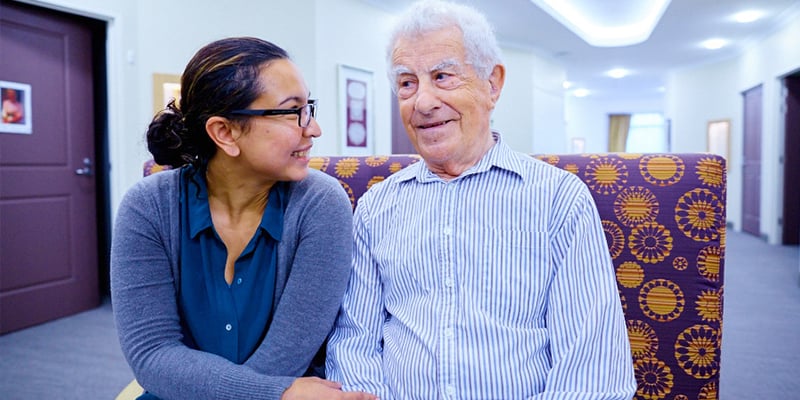How being asked to help out in the kitchen transformed George's quality of life.
George was only 18 years old when he left his family and migrated from Greece to Australia in search of better opportunities.
Starting life in a foreign country was challenging, however, George was determined to thrive in his new home. He taught himself English, worked hard as a shop assistant and eventually ran two successful businesses: a restaurant and a takeaway shop.
George’s real pride and joy, though, was his family. His wife Anne was his highest priority, along with his four sons who the couple raised in the suburbs of Sydney.
It was George’s sons who first noticed something was amiss after Anne died in 2016. George became forgetful and displayed signs of paranoia. A specialist diagnosed him as having Alzheimer’s disease.
Over time, George became unable to care for himself and the progression of the disease meant he was no longer able to stay at home. So his sons placed him in a residential care home. During his stay, George became distressed and physically threatened the staff on duty. His sons were told that the home could no longer care for their father.
At this point, the distraught family turned to HammondCare for help. In November 2016, George became the very first resident of the newly opened dementia-specific care home at Wahroonga. From the beginning, the staff treated George as a valued individual. This is central to HammondCare’s approach to care.
 “The day of George’s admission was our first day of opening,” says Skye Marshall, Manager at HammondCare Wahroonga. “We sat down with our staff and discussed George’s background, previous lifestyle, his current needs, and the social factors that concerned him. We wanted staff to see him first and foremost as the unique individual he is, so we could tailor his care around that.”
“The day of George’s admission was our first day of opening,” says Skye Marshall, Manager at HammondCare Wahroonga. “We sat down with our staff and discussed George’s background, previous lifestyle, his current needs, and the social factors that concerned him. We wanted staff to see him first and foremost as the unique individual he is, so we could tailor his care around that.”
This focus on understanding George and his background permeated his care in very practical ways. One of the most interesting developments as a result of this is that George assists with simple jobs in the kitchen and helps prepare food.
This is familiar terrain for a man who has made his living in the food industry for close to thirty years. And it’s an example of how HammondCare always tries to recognise and value the unique background of each of its residents.
HammondCare carers also accommodate George’s need to stay active. He is continually engaged during the day, whether through conversation, walks in the garden, or a spot of traditional Greek dancing. As a result, George steadily improved his level of well-being during his time at HammondCare Wahroonga. Although he still becomes anxious at times, the challenges that arose in his last care home have not resurfaced.
"Even better, doctors have been able to take George off the psychotropic medication he was previously prescribed. His demeanour has become more relaxed and calm."
This is believed in part to be due to the reassuring and familiar environment created by HammondCare’s cottage model that aims to offer a greater sense of control and belonging.
Most importantly, spending time with George has ceased to be a stressful ordeal for his family since he has moved to HammondCare Wahroonga. His son John says, “This is the best we’ve ever seen him.”
The family says that these days George’s grandchildren even catch glimpses of the quick-witted, self-made man they know and love. Michelle Tache, a carer at HammondCare Wahroonga, says helping George feel empowered in day-to-day living has had a positive impact on his wellbeing.
“If you don’t feel empowered, you feel like you are below people, and you can give up on life,” she says. “I know some residents start out feeling that way. But once you give them that sense of empowerment again, you can see it has a wonderful effect on their mood and their day-to-day wellbeing.”